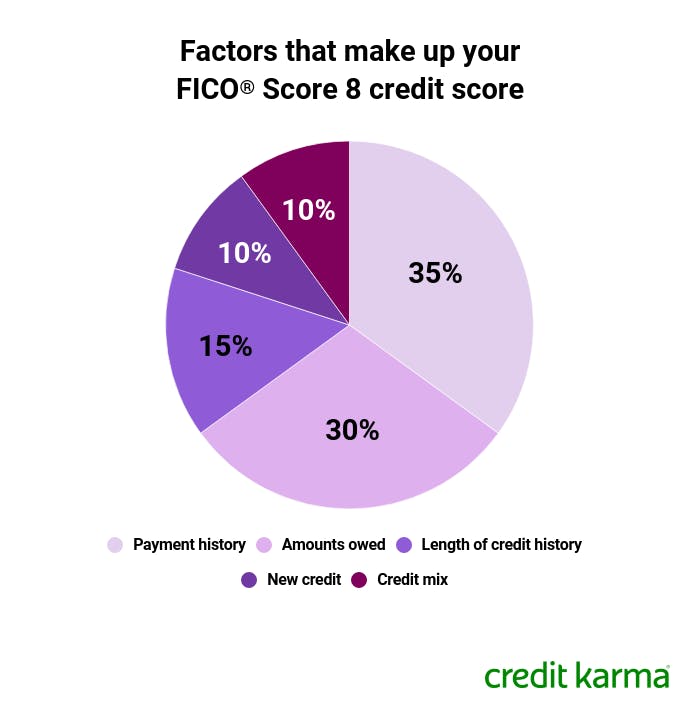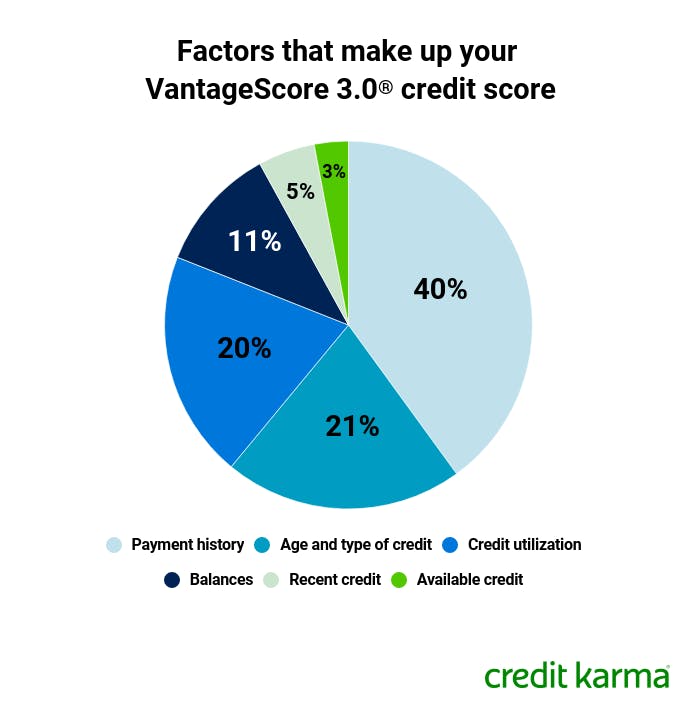Can Getting a Car Loan Help My Credit Score
Editorial Note: Credit Karma receives compensation from third-party advertisers, but that doesn't affect our editors' opinions. Our marketing partners don't review, approve or endorse our editorial content. It's accurate to the best of our knowledge when posted.
Advertiser Disclosure
We think it's important for you to understand how we make money. It's pretty simple, actually. The offers for financial products you see on our platform come from companies who pay us. The money we make helps us give you access to free credit scores and reports and helps us create our other great tools and educational materials.
Compensation may factor into how and where products appear on our platform (and in what order). But since we generally make money when you find an offer you like and get, we try to show you offers we think are a good match for you. That's why we provide features like your Approval Odds and savings estimates.
Of course, the offers on our platform don't represent all financial products out there, but our goal is to show you as many great options as we can.
While there's no universal minimum credit score required for a car loan, your scores can significantly affect your ability to get approved for a loan and the loan terms.
In the second quarter of 2020, people who got a new-car loan had average credit scores of 718 and those who got a used-car loan had average scores of 657, according to the Q2 2020 Experian State of the Automotive Finance Market report.
Lower credit scores could result in fewer offers and higher interest rates. But that doesn't necessarily mean you should throw in the towel if your scores aren't where you want them to be.
Read on to learn more about how your credit scores affect your odds of getting a car loan and ways you can increase your chances of approval and potentially receive better offers.
- How do my credit scores affect my car loan?
- Ways to increase your odds of approval and a better interest rate
- Which credit score is used for car loans?
- What are the factors that make up my credit scores?
How do my credit scores affect my car loan?
Your credit scores can affect your ability to get a car loan and the interest rate and terms you may be offered.
Before you begin car loan shopping, it's generally a good idea to check your credit scores and understand how they can influence the terms you get from auto lenders for a new- or used-car loan. This is also an opportunity to check your credit reports for errors, which could bring your credit scores down.
Car loan rates by credit score
The table below shows the average auto loan rate for new- and used-car loans based on credit scores, according to Experian data from the second quarter of 2020.
| Deep subprime (300–500) | Subprime (500–600) | Nonprime (600–660) | Prime (661–780) | Super prime (781–850) | |
|---|---|---|---|---|---|
| New | 13.97% | 11.33% | 7.14% | 4.21% | 3.24% |
| Used | 20.67% | 17.78% | 11.41% | 6.05% | 4.08% |
As you can see, having a good credit score (considered "prime" or "super prime") will give you a lower interest rate on your loan than an average or lower credit score. And having poor credit (considered "deep subprime") means you'll pay high interest rates.
A few extra percentage points may not seem like a big deal — but when that percentage is applied to the thousands of dollars that car loans typically amount to, it adds up quickly.
Here's how this plays out in reality. Let's say two borrowers — one a prime borrower and the other subprime — want to finance $10,000 for a used car. They both have a 60-month loan term. The subprime borrower is offered a 17.78% rate — the average for borrowers in this range in the second quarter of 2020, according to Experian. The prime borrower is offered the average 6.05% rate.
Over time, the subprime borrower will pay back $15,164, or $5,164 in interest. The prime borrower will pay about $1,614 in interest, for a total cost of $11,614. That's a difference of $3,550 in interest paid — and in this case, it all came down to credit scores.
Taking steps to improve your credit could increase your chances of getting approved for a loan with better terms, keeping more money in your pocket in the long run.
Ways to increase your odds of approval and a better interest rate
If you're in the market for a new car now or in the near future, there are a few steps you can take over time that could potentially increase your chances of getting approved for a loan or qualifying for a lower interest rate and more favorable terms.
Work on your credit scores
Working on your credit scores could unlock lower interest rates and preapprovals by more lenders. Your scores are largely dictated by whether you pay your bills on time and how much debt you have. Focusing on these two important factors could be a huge help in improving your credit.
Save for a down payment
Making a down payment on a car loan could help your chances of getting approved and may result in a lower rate. Plus, paying more upfront will decrease the amount you need to borrow, which can mean less interest paid overall.
Consider a co-signer
Having a co-signer with higher credit scores on your loan may help you get approved more easily or get a better interest rate.
Keep shopping
If you haven't found a rate and loan terms that work for you, continue looking. Credit Karma can help by showing your estimated loan term, interest rate and monthly payment amount across lenders.
Which credit score is used for car loans?
Credit-scoring models from FICO and VantageScore are most commonly used for auto loans, but lenders may also use the industry-specific FICO® Auto Scores.
With the FICO Auto Scores, FICO first calculates your "base" scores — your traditional FICO scores — then adjusts the calculation based on specific auto risks. These scores help lenders determine the likelihood you'll make your auto loan payments on time. FICO Auto Scores range from 250 to 900 points.
What are the factors that make up my credit scores?
No matter the scoring model, there are some keys to having higher credit scores. The charts below show what factors make up two popular credit-scoring models, the FICO® 8 credit score and VantageScore® 3.0 models.
 Image: ccupdateutilization-fico
Image: ccupdateutilization-fico  Image: ccupdateutilization-vantage
Image: ccupdateutilization-vantage Payment history
Banks want you to pay back what you borrow. That's why your payment history, which is the history of how many on-time payments you've made on loans or credit cards, is a major factor affecting your credit scores. Making late payments will cause your payment history to be less than 100%, which can harm your credit scores.
Credit utilization
Credit utilization is a way of calculating how much of your total available credit you're using. Generally, it's best to keep your total utilization as low as possible — most experts suggest keeping it under 30%.
Age of accounts
The age of credit history indicates how long you've had credit cards or other loans open. The longer your average account age, the more it can help your credit scores. Meanwhile, having several newly opened accounts may not help your credit scores because it will lower your average account age.
Account mix
Your account mix, or the types of credit accounts you have, may be a factor in determining your credit scores. Lenders generally like to see that you have a history of making on-time payments on a variety of credit accounts rather than just one type. So a mix of credit cards, plus other loans — like auto loans, student loans or mortgages — may help you build your credit scores.
Inquiries
Hard and soft inquiries happen when you apply for credit, or sometimes when you set up utilities or rent an apartment. Hard inquiries typically stay on your credit reports for two years. And if you have a large number of hard inquiries in a short period of time, it may lower your scores because lenders could view you as a borrower who's seeking credit.
Next steps
Now that you know a bit more about how your credit scores might affect your odds of getting a car loan, it's time to put your knowledge to work for you. First, check your credit scores and reports so you have an idea of how they stack up. You can get a free copy of your credit reports periodically from the three major credit bureaus on annualcreditreport.com. And you can check your Equifax and TransUnion credit reports anytime on Credit Karma.
If you can wait a while to buy a new vehicle, make a plan to work on any areas that might be keeping your credit scores lower than you'd like. But if you need a car sooner rather than later, be sure to shop around and compare loans across lenders — such as banks, credit unions and online lenders — so you can find the best rate and terms for you. Check out this article for more tips on getting a car loan. After you buy a car, keep working on your credit scores. Building up your credit could allow you to refinance your auto loan for a lower interest rate in the future.
Can Getting a Car Loan Help My Credit Score
Source: https://www.creditkarma.com/auto/i/credit-scores-car-loan
0 Response to "Can Getting a Car Loan Help My Credit Score"
Post a Comment